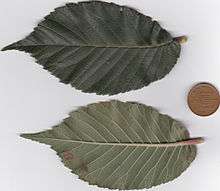Ulmus changii
| Ulmus changii | |
|---|---|
 | |
| Scientific classification | |
| Kingdom: | Plantae |
| (unranked): | Angiosperms |
| (unranked): | Eudicots |
| (unranked): | Rosids |
| Order: | Rosales |
| Family: | Ulmaceae |
| Genus: | Ulmus |
| Species: | U. changii |
| Binomial name | |
| Ulmus changii W. C. Cheng | |
Ulmus changii W. C. Cheng, occasionally known as the Hangzhou elm, is a small deciduous tree found across much of China in forests at elevations of up to 1800 m.[1] Owing to its increasing scarcity, U. changii was added to the Hainan Province Protected Plants List in 2006, and classed as 'Vulnerable' by the International Union for the Conservation of Nature (IUCN).
Description
The tree can reach a height of 20 m with a trunk of about 0.9 m d.b.h; the bark is dark grey. The leaves are generally ovate, < 11 cm long, glabrescent and smooth when mature. The wind-pollinated apetalous flowers are produced on second-year shoots in March - April, the samarae are almost orbicular, < 35 mm in diameter.[1]
Pests and diseases
U. changii was found to be among the least suitable elms for feeding and reproduction by the adult elm leaf beetle Xanthogaleruca luteola [2] in the United States.
Cultivation
The species is extremely rare in cultivation beyond China, although in the USA the species is rated hardy enough for USDA zone 5. There are no known cultivars of this taxon, nor is it known to be in commerce.
Subspecies & varieties
Two varieties are recognized: var. changii L.K.Fu, and var. kunmingensis W.C.Cheng.
Etymology
The tree is named for S. S. Chang, the Chinese botanist who identified the species in 1936.
Accessions
- North America
- Morton Arboretum. Acc. no. 11 2008. Cuttings grafted onto U. pumila rootstocks, planted out in 2008.
- Asia
- Europe
- Grange Farm Arboretum, Sutton St James, Lincolnshire, UK. Two juvenile trees from cuttings ex. Morton Arboretum on U. glabra rootstocks. Acc. no. 1059.
References
- 1 2 Fu, L., Xin, Y. & Whittemore, A. (2002). Ulmaceae, in Wu, Z. & Raven, P. (eds) Flora of China, Vol. 5 (Ulmaceae through Basellaceae). Science Press, Beijing, and Missouri Botanical Garden Press, St. Louis, USA. ISBN 1-930723-40-7
- ↑ Miller, F. and Ware, G. (2001). Resistance of Temperate Chinese Elms (Ulmuss spp.) to Feeding of the Adult Elm Leaf Beetle (Coleoptera: Chrysomelidae). Journal of Economic Entomology 94 (1): 162-166. 2001. Entom. Soc.of America.
